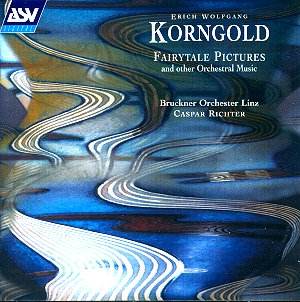Korngold is getting pretty good coverage from ASV and deservedly so. This is the second CD of orchestral works and there are also three CDs of chamber music. The music on this disc covers his life span, his very first attempt at orchestration at the age of thirteen and his last published opus. The music is easily recognisable as Korngold, very lush and tuneful with a style hovering between the two Strausses, Richard and Johann. Having said that, there is also Grieg aplenty (Hall of the Mountain King) in The Goblins, a movement from the Fairytale Pictures, which also hovers dangerously on the cusp of the Sound of Music. This delightful set of seven miniatures is a scored piano piece which, after one hearing in 1911, had to wait until 1997 and the Korngold centenary before a second. The music is colourfully scored, witty and gracious if a little cliché-ridden in places but surprising for the work of a child barely into his teens. When Henry Wood took the Schauspiel overture (another highly varied and colourful work with a grand Wagnerian sounding ending) to the Proms in 1912 it was, and remains, the work of the youngest composer ever to be played there. Korngold's music was played by all the pre-eminent German conductors of the day, from Nikisch to Busch and Furtwängler. His future as a composer of film scores is unsurprising when one listens to these early works, but he also has an enduring reputation as a composer of operas, Die tote Stadt being his greatest triumph, but here it's his overture to his early Op. 8 opera Violanta which is played, a tale of blood and lust premiered by no less than Bruno Walter in 1916, and later a vehicle for the great Jeritza. It has a spooky opening which then leads into (R) Straussian sensuous lushness of harps and solo horn. This was of course the immediate post-Rosenkavalier period and those celesta chords at the Presentation of the Rose scene never seem very far away. Korngold's harmonic language continually indulges in magical sidesteps to unrelated keys, but it his wonderfully natural talent for scoring which is so attractive in his music. No wonder that both Mahler and Puccini were admirers.
Korngold proved to be somewhat of an expert in Johann Strauss's operettas and in 1927 produced a fantasia for piano on (many familiar) melodies by the Austrian composer, which was scored with Korngold's approval by Franz Kopriva. The two mature works were both commissions from the American School Orchestras Association in the early 1950s (he had fled from Nazi Europe to America before the war). Straussiana is just what it says, three pieces of Johann Strauss II lifted out of the more obscure operettas and rescored by Korngold, including a witty polka à la pizzicato. The highly superstitious Korngold believed he would not live beyond his Op.42 so he did not use the description. Events proved him right and this Theme with seven variations was indeed his last work for he died in 1957.
Caspar Richter and the Bruckner Orchestra of Linz also did the first CD of orchestral music and make a fine job of this one too. Aside from some dead sounds between phrases or movements the sound of the Brucknerhaus in Linz is bright and spacious, the playing first-rate particularly in the sparkling moments, but they indulge in romantic lustre when Korngold (often) demands it. This is a no-holds-barred style and no quarter is given, enjoyable music with not a dull track anywhere.
Christopher Fifield

![]() Bruckner Orchestra Linz/Caspar
Richter
Bruckner Orchestra Linz/Caspar
Richter ![]() ASV CD DCA 1108 [68.38]
ASV CD DCA 1108 [68.38]